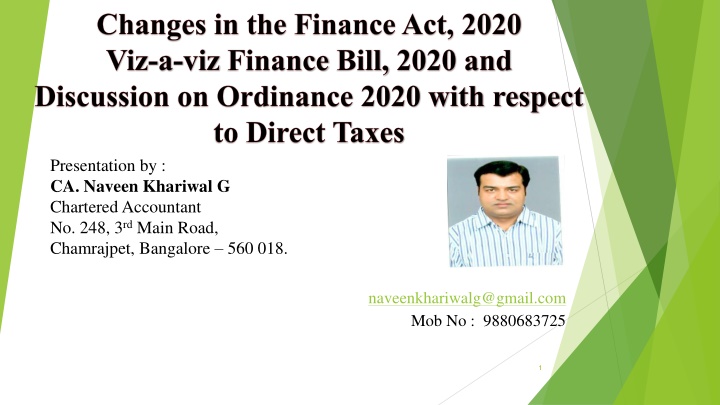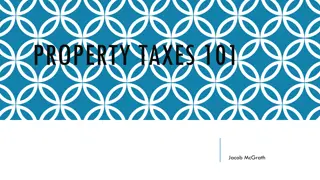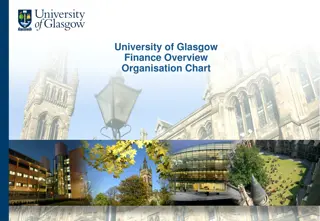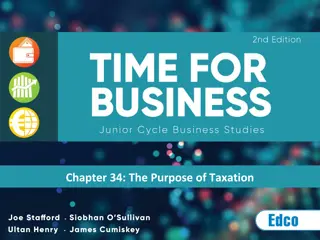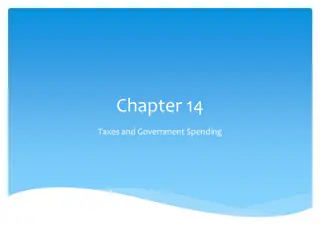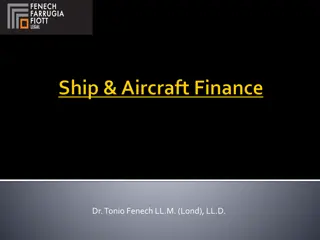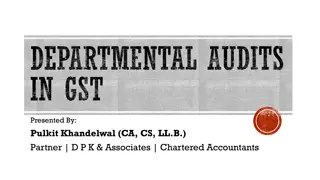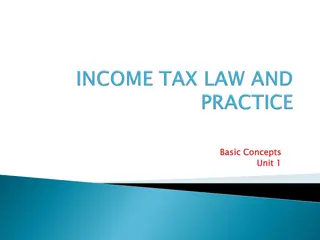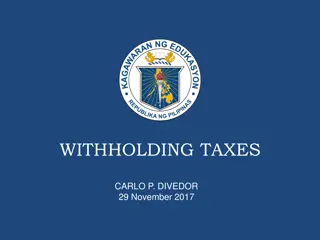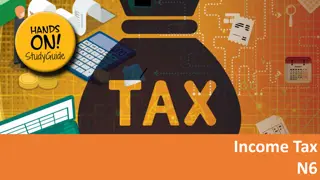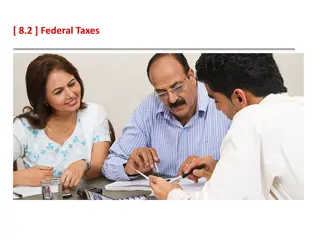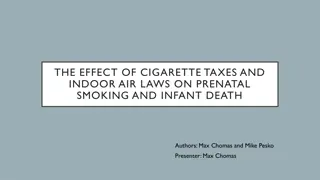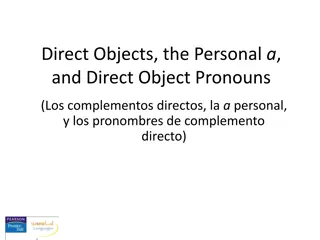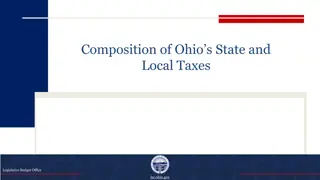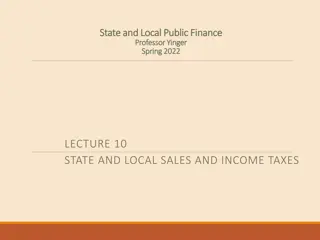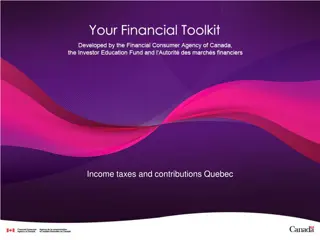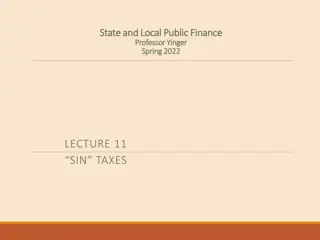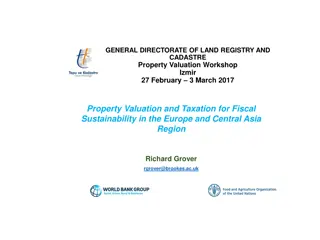Changes in Direct Taxes under Finance Act 2020
The presentation by CA Naveen Khariwal discusses amendments to the Finance Act, 2020, in relation to the Finance Bill, 2020, and the Ordinance 2020 concerning direct taxes. The changes include amendments to the definitions of Chief Commissioner and Residence in India among others.
Download Presentation

Please find below an Image/Link to download the presentation.
The content on the website is provided AS IS for your information and personal use only. It may not be sold, licensed, or shared on other websites without obtaining consent from the author.If you encounter any issues during the download, it is possible that the publisher has removed the file from their server.
You are allowed to download the files provided on this website for personal or commercial use, subject to the condition that they are used lawfully. All files are the property of their respective owners.
The content on the website is provided AS IS for your information and personal use only. It may not be sold, licensed, or shared on other websites without obtaining consent from the author.
E N D
Presentation Transcript
Changes in the Finance Act, 2020 Viz-a-viz Finance Bill, 2020 and Discussion on Ordinance 2020 with respect to Direct Taxes Presentation by : CA. Naveen Khariwal G Chartered Accountant No. 248, 3rd Main Road, Chamrajpet, Bangalore 560 018. naveenkhariwalg@gmail.com Mob No : 9880683725 1
Amendment of section 2 3. In section 2 of the Income-tax Act, (ii) in clause (15A), (a) after the words "Chief Commissioner of Income-tax", the words "or a Director General of Income-tax" shall be inserted; (b) after the words "Principal Chief Commissioner of Income-tax", the words "or a Principal Director General of Income-tax" shall be inserted. 2
1.AMENDMENT COMMISSIONER As per Section 2(15A) of the Income-tax Act, ChiefCommissioner means a person appointed to be a Chief Commissioner of Income-tax or a Principal Chief Commissioner of Income-tax. The Finance Act, 2020 makes an amendment to this provision to include the Director General and Principal Director General of Income-tax within the meaning of ChiefCommissioner . Now, the Principal Director General of Income Tax shall be treated as an authority at par with Director General of Income-tax. Hence, for all such purposes under the income tax act, the Principal Director General of Income-Tax shall have all the powers which have been conferred upon Director General of Income-tax. IN THE DEFINITION OF CHIEF 3
Amendment of section 6 Before the amendments Residence in India. 6. For the purposes of this Act, (1) An individual is said to be resident in India in any previous year, if he (a) is in India in that year for a period or periods amounting in all to one hundred and eighty-two days or more ; or (b) [***] (c) having within the four years preceding that year been in India for a period or periods amounting in all to three hundred and sixty-five days or more, is in India for a period or periods amounting in all to sixty days or more in that year. After the amendments Residence in India. 6. For the purposes of this Act, (1) An individual is said to be resident in India in any previous year, if he (a) is in India in that year for a period or periods amounting in all to one hundred and eighty-two days or more ; or (b) [***] (c) having within the four years preceding that year been in India for a period or periods amounting in all to three hundred and sixty-five days or more, is in India for a period or periods amounting in all to sixty days or more in that year. 4
Before the amendments Explanation. 1 In the case of an individual, After the amendments Explanation. 1 In the case of an individual, (a) being a citizen of India, who leaves India in any previous year as a member of the crew of an Indian ship as defined in clause (18) of section 3 of the Merchant Shipping Act, 1958 (44 of 1958), or for the purposes of employment outside India, the provisions of sub-clause (c) shall apply in relation to that year as if for the words sixtydays , occurring therein, the words one hundred and eighty-two days had been; (a) being a citizen of India, who leaves India in any previous year as a member of the crew of an Indian ship as defined in clause (18) of section 3 of the Merchant Shipping Act, 1958 (44 of 1958), or for employment outside India, the provisions of sub-clause (c) shall apply in relation to that year as if for the words sixty days , occurring therein, the words one hundred and eighty-two days had been ; the purposes of 5
Before the amendments (b) being a citizen of India, or a person of Indian origin within the meaning of Explanation to clause (e) of section 115C, who, being outside India, comes on a visit to India in any previous year, the provisions of sub- clause (c) shall apply in relation to that year as if for the words sixty days , occurring therein, the words one hundred and eighty-two days had been substituted. After the amendments (b) being a citizen of India, or a person of Indian origin within of Explanation to clause (e) of section 115C, who, being outside India, comes on a visit to India in any previous year, the provisions of sub-clause (c) shall apply in relation to that year as if for the words sixtydays , occurring therein, the words one hundred and eighty-two days substituted and in case of the citizen or person of Indian origin having total income, other than the income from foreign sources, exceeding fifteen lakh rupees during the previous year, for the words sixtydays occurring therein, the words one hundred and twenty days had been substituted. the meaning had been 6
(b) after clause (1), the following clause shall be inserted, namely: (1A) Notwithstanding anything contained in clause (1), an individual, being a citizen of India, having total income, other than the income from foreign sources, exceeding fifteen lakh rupees during the previous year shall be deemed to be resident in India in that previous year, if he is not liable to tax in any other country or territory by reason of his domicile or residence or any other criteria of similar nature; 7
Before the amendments 6(6) A person is said to be "not ordinarily resident" in India in any previous year if such person is - (a) an individual who has been a non- resident in India in nine out of the ten previous years preceding that year, or has during the seven previous years preceding that year been in India for a period of, or periods amounting in all to, seven hundred and twenty-nine days or less; or (b) a Hindu undivided family whose manager has been a non-resident in India in nine out of the ten previous years preceding that year, or has during the seven previous years preceding that year been in India for a period of, or periods amounting in all to, seven hundred and twenty-nine days or less. After the amendments 6(6) A person is said to be "not ordinarily resident" in India in any previous year if such person is - (a) an individual who has been a non- resident in India in nine out of the ten previous years preceding that year, or has during the seven previous years preceding that year been in India for a period of, or periods amounting in all to, seven hundred and twenty-nine days or less; or (b) a Hindu undivided family whose manager has been a non-resident in India in nine out of the ten previous years preceding that year, or has during the seven previous years preceding that year been in India for a period of, or periods amounting in all to, seven hundred and twenty-nine days or less. 8
Before the amendments After the amendments (c) in clause (6), in sub-clause (b), for the words days or less occurring at the end, the following shall be substituted, namely:- days or less; or (c) a citizen of India, or a person of Indian origin, having total income, other than the income from foreign sources, exceeding fifteen lakh rupees during the previous year, as referred to in clause (b) of Explanation 1 to clause (1), who has been in India for a period or periods amounting in all to one hundred and twenty days or more but less than one hundred and eighty-two days; or (d) a citizen of India who is deemed to be resident in India under clause (1A). 9
Explanation. For the purposes of this section, the expression "income from foreign sources" means income which accrues or arises outside India (except income derived from a business controlled in or a profession set up in India). 10
2. CHANGES IN PROVISIONS RELATING TO RESIDENTIAL STATUS 2.1. 120 days to substitute 182 days only if total income exceeds Rs.15 lakhs [Applicable from Assessment Year 2021-22] The Finance Bill, 2020 has proposed an amendment to the Explanation 1(b) that the concession in the period of stay in India, for an Indian citizen and a person of Indian origin, shall be reduced from 182 days to 120 days. No amendment has been proposed in Explanation 1(a). The Finance Act, 2020 has restricted the application of amended provisions of Explanation 1(b) only to that Indian citizen or a person of Indian origin whose total income, other than income from foreign sources, exceeds Rs. 15 lakhs during the previous year. For this provision, income from foreign sources means income which accrues or arises outside India (except income derived from a business controlled in or a profession set up in India). 11
2.2. Provision of DeemedResident applicable if total income exceeds Rs. 15 lakhs [Applicable from Assessment Year 2021-22] The Finance Bill, 2020 has proposed to insert a new clause (1A) to section 6 of the Income-tax Act to provide that an Indian citizen shall be deemed to be resident in India if he is not liable to tax in any country or jurisdiction by reason of his domicile or residence or any other criteria of similar nature. This change was proposed as it was noticed that some Indian citizens shift their stay in low or no tax jurisdiction to avoid payment of tax in India. 12
To avoid any misinterpretation and to give benefit to bonafide persons working in abroad, the CBDT has issued a clarification on 02-02-2020 that in case of an Indian citizen who becomes deemed resident of India under this proposed provision, income earned outside India by him shall not be taxed in India unless it is derived from an Indian business or profession. The Finance Act, 2020 introduced new section 6(1A). The new provision provides that an Indian citizen shall be deemed to be resident in India only if his total income, other than income from foreign sources, exceeds Rs. 15 lakhs during the previous year. For this provision, income from foreign sources means income which accrues or arises outside India (except income derived from a business controlled in or a profession set up in India). 13
Other conditions proposed in the Finance Bill, 2020 have been kept same, inter-alia, such individual shall be deemed to be Indian resident under the new provision only when he is not liable to tax in any country or jurisdiction by reason of his domicile or residence or any other criteria of similar nature. Thus, from Assessment Year 2021-22, an Indian Citizen earning total income in excess of Rs. 15 lakhs (other than from foreign sources) shall be deemed to be resident in India if he is not liable to pay tax in any country. The residential status of such person shall be that of a Not Ordinarily Resident due to new sub-clause (d) added to Section 6(6). Accordingly, he would be liable to pay tax in India on his global income other than the income not derived from a business controlled in or a profession set up in India. 14
2.3. Deemed resident to be treated as Not Ordinarily Resident [Applicable from Assessment Year 2021-22] As per Section 6, a resident individual or a Hindu Undivided Family (HUF) is deemed as Not Ordinarily Resident in India, if he satisfies any of the following conditions: a) Individual or Karta of HUF has been a non-resident in India for at least 9 years out of 10 years preceding the previous year; or b) Individual or Karta of HUF has been in India for 729 days or less during the period of 7 years preceding the previous year. The Finance Bill, 2020 has proposed to rationalize these conditions by providing just one condition that an Individual/HUF shall be deemed to be Not Ordinarily Resident if he/Karta of HUF has been a non-resident in any 7 out of the 10 immediately preceding years. The second condition has been proposed to be removed. 15
This proposed amendment has been withdrawn in the Finance Act, 2020. Thus, the existing conditions as contained under section 6(6) of the Income-tax Act shall continue. However, the Finance Act, 2020 has inserted the following two more situations wherein a resident person is deemed to be Not Ordinarily Resident in India: a) An Indian Citizen or a person of Indian origin whose total income (other than income from foreign sources) exceeds Rs. 15 lakhs during the previous year and who has been in India for a period of 120 days or more but less than 182 days; b) An Indian Citizen who is deemed to be resident in India as per new Section 6(1A). 16
2.4. The consequences upon considering an individual as not ordinarily resident . Section 5 of the Act deals with scope of total income. The provisions of section 5 are reproduced as under : Scope of total income. 5. (1) Subject to the provisions of this Act, the total income of any previous year of a person who is a resident includes all income from whatever source derived which (a) is received or is deemed to be received in India in such year by or on behalf of such person ; or (b) accrues or arises or is deemed to accrue or arise to him in India during such year ; or (c) accrues or arises to him outside India during such year : 17
Provided that, in the case of a person not ordinarily resident in India within the meaning of sub-section (6) of section 6, the income which accrues or arises to him outside India shall not be so included unless it is derived from a business controlled in or a profession set up in India. (2) Subject to the provisions of this Act, the total income of any previous year of a person who is a non-resident includes all income from whatever source derived which (a) is received or is deemed to be received in India in such year by or on behalf of such person ; or (b) accrues or arises or is deemed to accrue or arise to him in India during such year. 18
The above provisions are summarized as under : Remark Resident Non Resident Not Ordinary Resident includes all income from whatever source derived which - (a) is received or is deemed to be received in India; or (b) accrues or arises or is deemed accrue or arise to him in India; or Common Provision includes from whatever source derived which - (a) is received or is deemed to be received in India; or (b) accrues or arises or is deemed to accrue or arise to him in India; or all income includes all income from whatever source derived which - (a) is received or is deemed to be received in India; or (b) accrues or arises or is deemed accrue or arise to him in India. to to 19
Variation (c) accrues or arises to outside India: (c) the income derived from a business controlled in or a profession set up in India him Summary Worldwide income in India Only income taxable in India Indian source Indian source income and worldwide income derived from a business controlled in or a profession set up in India. taxable 20
RESIDENCY RULES Particulars Earlier provisions Finance Bill 2020 Amendment to Bill (Relaxation) Applicable only if total income exceeds Rs. 15 Lakhs (excluding foreign sourced) Resident (a) 182 days or more or (b) 60* days or more and 365 days in previous 4 financial years Instead of 182 days the period was reduced to 120 days for the Indian citizen or a person of Indian origin who visit India. A citizen of India to be deemed to be resident in India if he is not liable to tax in any other country or territory (a) NR in India in 7 out of 10 previous preceding that year. Deemed Residency No such concept Resident but not NOR (a) NR in India in 9 out of 10 previous years preceding that year, or (b) Is in India for 729 days or less in during the 7 previous years preceding the relevant tax year. Amendment withdrawn Further for a resident, if stay exceeds 120 days but < 182 days, status shall be RNOR Deemed status RNOR years 21 Resident - *To be read as 182 days for Indian citizen who leave India for employment or living outside India comes on a visit to India.
RESIDENCY SNAPSHOT Stay India in 100 Days 119 days 120 Days 181 Days 182 Days Non-Resident if income < Rs. 15 Lakhs. Resident if income exceeding Rs. 15 Lakhs RNOR RNOR RNOR Status Non-Resident Non-Resident Resident RNOR ROR / NA NA Could ROR be 22
Dual residency Tie-Breaker Rules : Permanent Home : Can be rented home too Centre of Vital Interest : Where are personal and economic relations closer Habitual Abode : Where he is likely to return 1. 2. 3. 4. Nationality. 23
3. AMENDMENTS MADE TO SECTION 10(23C) TO REMOVE CONFLICTING PROVISIONS 3.1. Corpus donations received by Section 10(23C) institutions will be exempt from tax If institutions, registered under section 12AA, receive any income in the form of voluntary contributions with a specific direction that it should form part of the corpus of the trust or institution, it shall not be included in the total income of such trust or institution. However, no such specific exemption was available to entities registered under section 10(23C). Hence, it was always a matter of litigation, compelling the institutions coming within the scope of section 10(23C) to apply even their corpus donations for getting the benefit of exemption. This was prejudicial to them because they cannot build up the corpus fund in the absence of specific exemption available to them. 24
The Finance Act, 2020 inserted an Explanation to the Third Proviso to Section 10(23C) to clarify that the corpus donations shall not form part of the income of such institutions. It has been provided that any corpus donations received by such fund or institution or any university or other educational institution or any hospital or other medical institution, shall not be included in the income of such entities. Hence, institutions or funds availing exemption under section 10(23C) now specifically get the exclusion from the requirement of mandatory application of income in respect of corpus donations . This amendment brings exemption available to institutions registered under section 10(23C), for the corpus donations, at par with exemption available to trusts or institutions registered under section 12A/12AA/ 12AB. 25
3.2. Corpus donation not to be considered as an application of Income As per extant provisions, entities registered under section 12A/12AA are provided with the benefit of exemption in respect of corpus donations. Any contribution by a charitable or religious trust to any other trust registered under Section 12AA, with a specific direction that it shall form part of the corpus of recipient trust is not considered as an application of income for the donor trust. 26
A similar provision is contained in the Twelfth Proviso to Section 10(23C) that any contribution by fund or trust or institution or any university or other educational institution or any hospital or other medical institution [as referred to in sub-clause (iv) or sub-clause (v) or sub-clause (vi) or sub-clause (via) of Section 10(23C)], with a specific direction to the trust or institution registered under section 12AA that it shall form part of the corpus of recipient trust, consequently, it shall not be treated as application of income for the donor. Currently, this restriction was only in respect of corpus donations made to entities registered under section 12AA. 27
The Finance Act, 2020 provides that the corpus donations shall not form part of the income of the funds or institutions availing the benefit of section 10(23C). A consequential amendment has also been made that corpus donations by one such entity to another entity shall not be treated as application of income. In other words, the corpus donation by fund or trust or institution or any university or other educational institution or any hospital or other medical institution referred to in sub-clause (iv) or sub- clause (v) or sub-clause (vi) or sub clause (via) to another such fund shall not be considered as an application of income. This has been done to ensure that these institutes do not avail the dual benefit, i.e., exemption of income as well as the application of income. 28
3.3. NO DEDUCTION OF CORPUS DONATIONS MADE TO SECTION 10(23C) APPROVED INSTITUTIONS [Section 11]. Income derived from property held under trust, wholly for charitable or religious purpose, is exempt from tax to the extent such income is applied to such purposes in India. Where any such income is accumulated or set apart for application to such purposes in India, the income so accumulated or set apart is also exempt to the extent it is not in excess of 15% of the income from such property. However, the donations by a charitable institution to another trust are considered as an application of income except the donation made with a specific direction that it shall form part of the corpus of the donee. 29
At present, any contribution by a charitable or religious trust registered under section 12AA to any other trust registered under Section 12AA, with a specific direction that it shall form part of corpus of recipient trust shall not be treated as application of income for the donor trust. The Finance Act, 2020 provides that any corpus donation made by trust or institution registered under section 12AA to any fund or trust or institution or any university or other educational institution or any hospital or other medical institution referred to in sub-clause (iv) or sub-clause (v) or sub-clause (vi) or sub-clause (via) of section 10(23C) shall not be treated as an application of income. In view of this amendment, corpus donation given by a Section 12AA registered institution to section 10(23C) approved institution will not be treated as an application of income. 30
This amendment has been introduced so that these institutions do not avail the dual benefit of exemption as the corpus donations received by institutions approved under section 10(23C) shall not be treated as an income in their hands. Example, A charitable institution approved under section 12AA has an income of Rs. 5 Lakh during the year. It applied income for charitable purposes to the tune of Rs. 3.75 Lakhs. It also made corpus donation of Rs. 50,000 to an educational institution approved under section 10(23C). The income in such case, before and after amendment shall be computed as under: 31
4. SCOPE OF EXEMPTION UNDER 10(23FE) EXPANDED The Finance Bill, 2020 proposed to introduce a new section 10(23FE) under the Income tax Act to attract investment and promote infrastructure facilities in India. It provides exemption to income of Sovereign Wealth Fund or wholly owned subsidiary of Abu Dhabi Investment Authority, in the nature of dividend, interest or long-term capital gains arising from an investment made by it in India, whether in the form of debt or equity, in a company or enterprise carrying on the business of developing, operating or maintaining any infrastructure facility as defined in Explanation to clause (i) of section 80-IA(4) of the Act or such other business as may be notified by the Central Government in this behalf. However, the investment is required to be made on or before 31-03- 2024 and held for at least 3 years 32
Sovereign Wealth Fund (SWF) as the name suggest is an investment fund which is primarily owned by the Government of any Country. SWF invests globally in real and financial assets such as stocks, bonds, real estate, precious metals, or in alternative investments funds (AIFs) such as private equity fund or hedge funds. As Sovereign Wealth Fund and Abu Dhabi Investment Authority can invest in a company or enterprise either directly or indirectly through AIFs, the Finance Act, 2020 has expended the scope of section 10(23FE) whereby exemption shall be available even if investment in infrastructure companies is made through AIFs. In this respect, it has been provided that specified persons shall be exempt from paying tax on any income arising from investment in Category-I or Category-II AIFs provided AIFs invest 100% of the amount in one or more specified company or entity, i.e., company or enterprise carrying on the business of developing, operating or maintaining any infrastructure facility as defined in Explanation to clause (i) of section 80-IA(4) of the Act or such other business as may be notified by the Central Government in this behalf. 33
Exemption shall be available even if specified persons invests in preference share capital of the company. Further, as section 10(23FE) is introduced for investment in infrastructure activities, exemption shall be available even in respect of income arising from investment in Infrastructure Investment Trusts (InVITs). Furthermore, in addition to Sovereign Wealth Fund and Abu Dhabi Investment Authority, a pension fund created or established under the law of a foreign country is included in the list of specified persons and shall also be eligible for exemption under section 10(23FE) provided it is not liable to tax in such foreign country and satisfy such other conditions as may be specified in this behalf. The amended provision also provides that investment should be made during the period between 01-04-2020 to 31-03-2024. This amendment is made to clarify that no exemption shall be available in respect of income arising from investment made before 01-04-2020. 34
A proviso has been inserted to withdraw the exemption if specified persons subsequently fails to satisfy the conditions on basis of which exemption was claimed in earlier years. It is provided that the amount of exemption claimed in earlier years shall be deemed to be the income of the assessee of the year in which it fails to comply with the conditions. Section 10(23FE) after the amendment made in Finance Act, 2020 can be explained with the help of following questionnaire: 4.1. Who shall be eligible to claim exemption under section 10(23FE)? Exemption under section 10(23FE) shall be available to following persons: a) Sovereign Wealth Fund, i.e., Investment funds owned and controlled by the Government of a foreign country. b) Wholly owned subsidiary of Abu Dhabi Investment Authority. c) Pension fund created or established under the law of a foreign country. 35
4.2. When exemption under section 10(23FE) shall be available to eligible persons? Exemption under section 10(23FE) shall be available when eligible persons (as referred above) make investment in following: a) Debt or share capital (equity as well as preference) of a company or enterprise carrying on the business of developing, operating or maintaining any infrastructure facility as defined in Explanation to clause (i) of section 80-IA(4). b) Units of Category-I or Category-II AIFs who made 100% investment in above companies or entity. c) Units of Infrastructure Investment Trusts (InVITs). Further, the investment should be made between 01-04-2020 to 31-03-2024 and held for at least 3 years. 36
4.3. Which type of income shall be eligible for exemption under section 10(23FE)? Exemption under section 10(23FE) shall be available in respect of income arising in the nature of dividend, interest and long-term capital gain from investment as specified above. 37
5. DIVIDEND RECEIVED ON OR AFTER 01-04-2020 SHALL NOT BE TAXABLE IF DDT IS ALREADY PAID BY THE COMPANY With effect from 01-04-2020, the Finance Bill, 2020 proposed to abolish the Dividend Distribution Tax and move to the traditional system of taxation wherein companies do not pay DDT on dividend and, the shareholders are liable to pay tax on such income at the applicable tax rate. Consequent amendments have also been proposed to Section 10(34) and Section 115-O. The dividend received on or after 01-04-2020 will not be exempt in the hands of the shareholder and the company will not be liable to pay DDT on any amount of dividend declared, distributed or paid by the company on or after 01-04-2020. Section 115BBDA was also proposed to be amended that shareholders receiving dividend in excess of Rs. 10 lakhs shall not be taxed if the same is declared, distributed or paid on or after 01-04-2020. 38
As per Section 115-O, DDT is required to be deposited by the company on the amount of dividend within 14 days of the earliest of the following dates: 1. Declaration of dividend; 2. Distribution of dividend; or 3. Payment of dividend. Similarly, tax under Section 115BBDA is required to be paid by the shareholders if the aggregate amount of dividend assessed in his income exceeds Rs. 10 lakhs during the previous year. Section 8 read with ICDSIV provides that irrespective of the method of accounting followed by the assessee, any dividend (including deemed dividend) declared, distributed or paid by a company is chargeable to tax as income of the previous year in which it is so declared, distributed or paid. However, interim dividend is chargeable to tax as the income of the previous year in which it is paid. 39
Companies and shareholders are required to pay tax on dividend (except in case of interim dividend) on due or receipt basis, whichever is earlier. The amendment to section 10(34) provides that no exemption shall be available in respect of dividend received on or after 01- 04- 2020. Thus, exemption could be denied in respect of that dividend received on or after 01-04-2020 but declared on or before 31-03- 2020. To remove this ambiguity, the Finance Act, 2020 has made changes to section 10(34) to provide that dividend received by assessee on or after 01-04-2020 shall not be included in his income if tax has already been paid on such dividend under section 115-O or section 115BBDA, as the case may be. 40
Insertion of new section 80M. 40. After section 80LA of the Income-tax Act, the following section shall be inserted with effect from the 1st day of April, 2021, namely: Deduction in respect of certain intercorporate dividends 80M. (1) Where the gross total income of a domestic company in any previous year includes any income by way of dividends from any other domestic company or a foreign company or a business trust, there shall, in accordance with and subject to the provisions of this section, be allowed in computing the total income of such domestic company, a deduction of an amount equal to so much of the amount of income by way of dividends received from such other domestic company or foreign company or business trust as does not exceed the amount of dividend distributed by it on or before the due date. 41
(2) Where any deduction, in respect of the amount of dividend distributed by the domestic company, has been allowed under sub-section (1) in any previous year, no deduction shall be allowed in respect of such amount in any other previous year. Explanation. For the purposes of this section, the expression duedate means the date one month prior to the date for furnishing the return of income under sub- section (1) of section 139. . 42
6. SECTION 80M DEDUCTION TO BE AVAILABLE FROM AY 2021-22 TO THE COMPANIES OPTING FOR NEW TAX REGIME The Taxation Law (Amendment) Act, 2019 has inserted two new sections (section 115BAA and section 115BAB) to provide domestic companies with an option to be taxed at concessional tax rates with effect from April 1, 2020. Various conditions are provided in the new sections to opt for the new tax regimes including non availability of deductions under Chapter-VIA except deductions under Section 80JJAA or Section 80LA. The Finance Bill, 2020 has proposed to allow the deduction, to the domestic companies opting for the concessional rates, under section 80M as well. Section 80M is a newly proposed section which provides deduction in case of inter- corporate dividends with effect from 01-04-2021. Section 80M has been introduced by the Finance Bill, 2020 but it does not provide any clarity on the date of applicability of the provision. The Finance Act, 2020 has clarified that deduction under section 80M shall be available to the companies opting for new tax regime with effect from Assessment Year 2021-22. 43
7. SCOPE OF DEDUCTION UNDER SECTION 80M IN RESPECT OF INTERCORPORATE DIVIDEND EXPANDED With effect from 01-04-2020, the Finance Bill, 2020 proposed to abolish the Dividend Distribution Tax and move to the traditional system of taxation wherein companies do not pay DDT on dividend and, the shareholders are liable to pay tax on such income at the applicable tax rate. To remove the cascading effect where a domestic company receives dividend from another domestic company, a new section 80M has been introduced. This section provides that inter-corporate dividend received by a domestic co. from another domestic co. shall be reduced from the total income of that company that further distributes such dividend income to the shareholders within one month before the due date of filing of return. 44
The Finance Act, 2020 expanded the scope of deduction available under Section 80M to include the dividend received from a foreign company and business trust. Thus, a domestic company can claim deduction under section 80M even in those cases where dividend received from a foreign company or business trust is further distributed to shareholders within one month before the due date of filing of return. 45
Insertion of new sections 115BAC 53. After section 115BAB of the Income-tax Act, the following sections shall be inserted with effect from the 1st day of April, 2021, namely: Tax on income of individuals and Hindu undivided family. 115BAC(1) Notwithstanding anything contained in this Act but subject to the provisions of this Chapter, the income-tax payable in respect of the total income of a person, being an individual or a Hindu undivided family, for any previous year relevant to the assessment year beginning on or after the 1st day of April, 2021, shall, at the option of such person, be computed at the rate of tax given in the following Table, if the conditions contained in sub-section (2) are satisfied, namely: 46
Provided that where the person fails to satisfy the conditions contained in sub-section (2) in any previous year, the option shall become invalid in respect of the assessment year relevant to that previous year and other provisions of this Act shall apply, as if the option had not been exercised for the assessment year relevant to that previous year: Provided further that where the option is exercised under clause (i) of sub- section (5), in the event of failure to satisfy the conditions contained in sub- section (2), it shall become invalid for subsequent assessment years also and other provisions of this Act shall apply for those years accordingly. 48
(2) For the purposes of sub-section (1), the total income of the individual or Hindu undivided family shall be computed, (i) without any exemption or deduction under the provisions of clause (5) or clause (13A) or prescribed under clause (14) (other than those as may be prescribed for this purpose) or clause (17) or clause (32), of section 10 or section 10AA or section 16 or clause (b) of section 24 (in respect of the property referred to in sub-section (2) of section 23) or clause (iia) of sub- section (1) of section 32 or section 32AD or section 33AB or section 33ABA or sub-clause (ii) or sub-clause (iia) or sub-clause (iii) of sub- section (1) or sub-section (2AA) of section 35 or section 35AD or section 35CCC or clause (iia) of section 57 or under any of the provisions of Chapter VI-A other than the provisions of sub-section (2) of section 80CCD or section 80JJAA; 49
(ii) without set off of any loss, (a) carried forward or depreciation from any earlier assessment year, if such loss or depreciation is attributable to any of the deductions referred to in clause (i); (b) under the head Income from house property with any other head of income; (iii) by claiming the depreciation, if any, under any provision of section 32, except clause (iia) of sub-section (1) of the said section, determined in such manner as may be prescribed; and (iv) without any exemption or deduction for allowances or perquisite, by whatever name called, provided under any other law for the time being in force. 50
